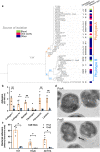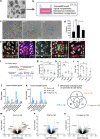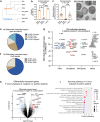Parvimonas micra, an oral pathobiont associated with colorectal cancer, epigenetically reprograms human colonocytes
- PMID: 37842920
- PMCID: PMC10580862
- DOI: 10.1080/19490976.2023.2265138
Parvimonas micra, an oral pathobiont associated with colorectal cancer, epigenetically reprograms human colonocytes
Abstract
Recently, an intestinal dysbiotic microbiota with enrichment in oral cavity bacteria has been described in colorectal cancer (CRC) patients. Here, we characterize and investigate one of these oral pathobionts, the Gram-positive anaerobic coccus Parvimonas micra. We identified two phylotypes (A and B) exhibiting different phenotypes and adhesion capabilities. We observed a strong association of phylotype A with CRC, with its higher abundance in feces and in tumoral tissue compared with the normal homologous colonic mucosa, which was associated with a distinct methylation status of patients. By developing an in vitro hypoxic co-culture system of human primary colonic cells with anaerobic bacteria, we show that P. micra phylotype A alters the DNA methylation profile promoters of key tumor-suppressor genes, oncogenes, and genes involved in epithelial-mesenchymal transition. In colonic mucosa of CRC patients carrying P. micra phylotype A, we found similar DNA methylation alterations, together with significant enrichment of differentially expressed genes in pathways involved in inflammation, cell adhesion, and regulation of actin cytoskeleton, providing evidence of P. micra's possible role in the carcinogenic process.
Keywords: Colorectal cancer; DNA methylation; Parvimonas micra; colonic epithelial primary cells; pathobionts.
Conflict of interest statement
No potential conflict of interest was reported by the author(s).
Figures





References
Publication types
MeSH terms
Supplementary concepts
Grants and funding
LinkOut - more resources
Full Text Sources
Medical
Molecular Biology Databases
